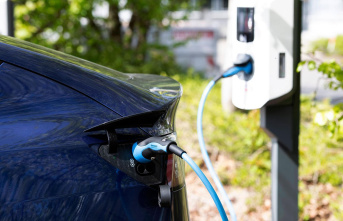Hydrogen is considered the fuel of the future. It can be obtained from green energy, it burns completely free of pollutants. Although there are losses when electricity is converted into hydrogen, the gas can be stored for a long time and transported easily. Australian scientists took advantage of this and invented a new type of hybrid engine.
In a vehicle, the hydrogen is normally used in a fuel cell - here it generates electricity. In terms of drive, a hydrogen car is an electric vehicle with only a gas tank and cell instead of batteries.
But there is another way: Instead of the expensive cell, the gas can also be burned in an engine. Such a hydrogen engine is not very different from other combustion engines. Only that, as exhaust water only drips out of the exhaust.
Scientists in Australia have now achieved a feat: They were able to prepare a diesel engine so that it can be powered by both diesel and environmentally friendly hydrogen.
That alone would be spectacular. But the dual-fuel system with hydrogen-diesel direct injection can do even more, it is a retrofit system that can be used to convert existing engines. It is said that every heavy diesel engine used in trucks, in agriculture and in mining can be rebuilt in just a few months.
The work, published in the International Journal of Hydrogen Energy, shows that the hybrid system can then reduce CO2 emissions by 85.9%. "This new technology significantly reduces CO2 emissions from existing diesel engines so it could go a long way towards reducing our carbon footprint, particularly in Australia with its mining, farming and other heavy industries where diesel engines are widely used," says Professor Shawn Kook from the School of Mechanical and Manufacturing Engineering in Sydney.
Why is that so important? On the one hand, there are still no environmentally friendly drives for many heavy machines. With the hybrid system, any heavy machine could be converted from a tank to a giant excavator. In addition, the transition times could be shortened enormously. As soon as the hydrogen is available in sufficient quantities, the machine park can be converted without waiting for the end of the equipment's life cycle.
"Retrofitting diesel engines that are already in use is much faster than waiting for the development of completely new fuel cell systems that will not be on the market on a larger scale for at least ten years."
The engine uses original diesel injection and adds in-cylinder hydrogen injection. The trick is the right mixture in the cylinder. 'Just putting hydrogen in the engine and mixing everything together creates a lot of nitrogen oxide (NOx) emissions, which are a major cause of air pollution and acid rain,' says Prof Kook. Another advantage, the engine is not picky. It does not require the high-purity hydrogen that fuel cells do.
Of course, the question arises as to where the green hydrogen from natural sources should come from. But this problem presents itself differently in Australia than in Europe. The country has infinite areas and coasts. Electricity can be generated there naturally. In view of the dimensions and factors such as the higher solar radiation, it will be possible to produce solar power much more cheaply in Australia than in Germany, for example, so that the conversion losses when converting into green hydrogen would also be bearable.







